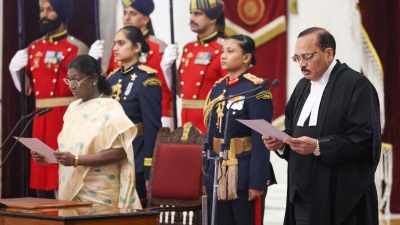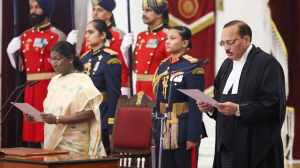Bengal minister who called Governor ‘the new vampire in town’ has clashed horns with him in Education portfolio
An actor, playwright, film director and professor who joined TMC in 2011, he had been trying to bury the hatchet between the Governor and the state government in his second stint as education minister, before latest escalation
 West Bengal Education Minister Bratya Basu (left) and Governor C V Ananda Bose (right). (X/@basu_bratya/@BengalGovernor)
West Bengal Education Minister Bratya Basu (left) and Governor C V Ananda Bose (right). (X/@basu_bratya/@BengalGovernor) THE WAR of words between Education Minister Bratya Basu and Governor C V Ananda Bose in West Bengal escalated on Saturday, with Basu describing Bose as “the new vampire in town”, after the Governor threatened the minister with “midnight action”. This was followed by a communique issued by the Raj Bhavan (Governor’s residence) late in the night, saying that the Governor had dispatched “two confidential letters” — one to the state secretariat Nabanna, “the other to Delhi”.
While the Raj Bhavan official didn’t reveal the content of the letters, he said the Governor had signed them a couple of hours after holding a meeting with state Chief Secretary H K Dwivedi at Raj Bhavan. The topic of the meeting was not disclosed by either the state government or Raj Bhavan.
It brought the spotlight back on Basu, 53, a renowned theatre personality, actor, playwright, film director and professor who turned politician when he joined the Trinamool Congress (TMC) in 2011. Soon afterwards, he fought in the Assembly polls that year, and defeated heavyweight CPI(M) leader and then minister Gautam Deb from the Dum Dum seat. Following his victory and the formation of government by the TMC, Basu was inducted in the first Mamata Banerjee Cabinet as Minister for Higher Education.
As minister, Basu became known for tough decisions. Soon after he took over, he launched a survey on the condition of higher education in the state, taking many surprise at a time when the new government was still trying to find its feet.
In 2013, Basu put on hold students’ union elections across West Bengal, after widespread condemnation following the killing of a sub-inspector of the Special Branch of the Kolkata Police and serious injuries to four students in a clash between leaders of the Trinamool Chhatra Parishad (TMCP) and the Congress’s student wing, the Chhatra Parishad (CP). This happened during the filing of nominations for students’ union elections at Harimohan Ghosh College in Kolkata.
According to sources, the decision did not go down well with the TMC leadership, and in May 2014, Basu was replaced with heavyweight TMC leader Partha Chatterjee, who was the then commerce and industries minister. Basu was assigned the portfolio of Tourism.
After the TMC won the next Assembly polls in May 2016, Basu again got Tourism, apart from Science, Technology and Bio-Technology, Information Technology, and Electronics. When the TMC won power for the third straight term in 2021, Basu was brought back as Education Minister, replacing Chatterjee.
It was during Chatterjee’s tenure as Education Minister that an alleged recruitment scam took place, coming to light in 2022. Chatterjee is currently in judicial custody for his involvement in the scam, in which school jobs were bought and sold against kickbacks.
Basu is credited with having made several attempts to revive the education sector in the state since he got back the portfolio. That includes conducting the West Bengal Teachers Eligibility Test for primary teachers in December last year, after a gap of five years.
He also ensured coordination among all education boards in an effort to weed out corruption. This was done in the backdrop of the recruitment scam, which had resulted in the arrest of several incumbent and retired government officials. But Basu was criticised for advocating for a PPP model to “save government-funded schools in the state”.
The genesis of the ongoing stand-off between Raj Bhavan and Nabanna lies in Jagdeep Dhankhar’s tenure as West Bengal Governor. During his three years as Governor, the current Vice President of India had constantly engaged in a war of words with the state government, including over the education department.
After former bureaucrat C V Ananda Bose was made the Governor of West Bengal in November 2022, Basu as the Education Minister played an active role in trying to bury the hatchet between Raj Bhavan and the West Bengal government. In January this year, Basu held several meetings with the Governor and even declared that the Governor will remain the Chancellor of state universities, despite the state government having already passed a Bill in the Assembly making Chief Minister Mamata Banerjee the ex-officio Chancellor.
In the second week of May, Governor Bose promulgated The West Bengal University Laws (Amendment) Ordinance 2023, which made changes in how search committees for the appointment of VCs in state universities could be formed. From the earlier three-member search committees with one representative each nominated by the state education department, the concerned university and the Governor; the new five-member search committees were set up with one representative each nominated by the CM, the state education department, the state higher education council, the University Grants Commission (UGC) and the Governor.
However, a PIL was filed in the Calcutta High Court, challenging the ordinance, following which the court sought a report from the state government on it. With the matter concerning the formation of search committees stuck in court, the Governor took matters in his own hands in June, and appointed interim VCs for 11 out of the 17 state universities. As interim VCs can be appointed for a maximum of three months, and require frequent validation, Bose went on renewing their appointments every month.
Then, in an unprecedented move in July, Bose appointed former Karnataka High Court chief justice Subhro Kamal Mukherjee as the interim VC of Rabindra Bharati University. It was the first of several interim VCs picked by the Raj Bhavan who came from a non-academic background. Mukherjee, who had retired in 2017 was later given additional charge of Presidency University as the officiating VC. He will also head a ‘Peace and Social Integration Committee’ set up by the Governor.
With the three-month period for interim VCs appointed in June nearing its end, on September 3, Bose made fresh appointments of interim VCs in seven more universities and initiated the process for the same in nine others. This seems to have been the final straw in ties between Nabanna and Raj Bhavan.
TMC state vice-president Jayprakash Majumdar said Basu has been trying hard to uplift the state’s education sector. “He is a hard-working minister who only wants the best for the state’s education sector. He has been trying to forge a relationship between Raj Bhavan and the Mamata Banerjee government. But the Governor is taking unilateral decisions to undermine this initiative,” said Majumdar.
While in ministry, Basu won the Sahitya Akademi Award for his book Mir Jafar O Anyanya Natak (a compilation of three plays: Mir Jafar, Ekdin Aladin and Ami Anukulda aar Ora) in 2021. He is also the recipient of several awards for his contribution in the field of theatre, and has directed and acted in several Bengali films that have received critical acclaim.
The three-time MLA is presently the Chairperson of Paschimbanga Bangla Akademi and the Minerva Natyasanskriti Charchakendra under the Department of Information and Cultural Affairs.





- 01
- 02
- 03
- 04
- 05


























